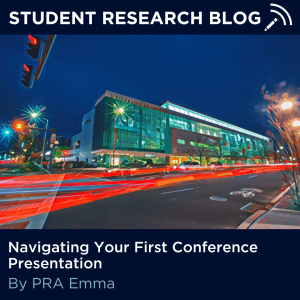Meet Hansuja Chaurasia ’26, an OUR Peer Research Ambassador majoring in Allied Health Sciences and minoring in Spanish.
 What is the focus of your research?
What is the focus of your research?
Currently, I am involved in the Kienzler Lab in the chemistry department. We work with photoswitches, which are molecules that change shape when interacting with light. I am working on the synthesis of light-sensitive calcium channel inhibitors. I recently have been helping out with research in the Duffy Lab in the Allied Health Department, working on promoting nutrition and oral health in toddler populations.
Why did you get involved in research?
I got involved in research because I loved the idea of applying the things I’ve learned in my academic career to an actual scientific experience. I wanted to see firsthand what the scientific method is like in the real world, and how new discoveries and knowledge are made. Research allows me to dive deeper into topics I’m passionate about, to ask questions and challenge myself, and to contribute to the overall advancement of scientific knowledge, even in a small way. Continue reading








